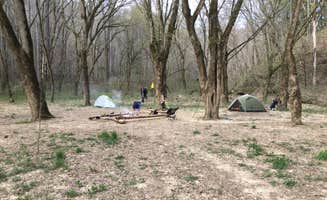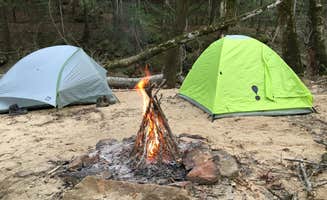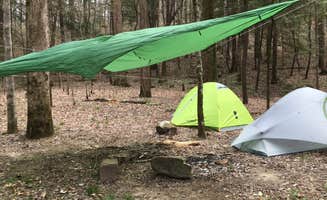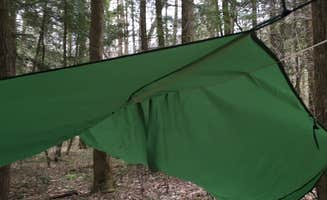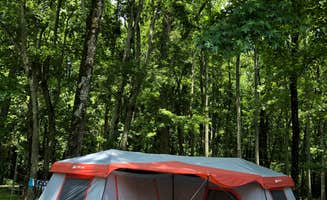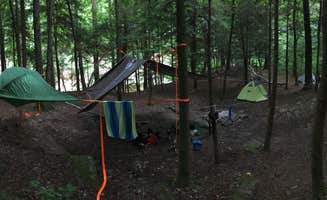Tent campsites near Hayden, Alabama range from roadside primitive spots to secluded backcountry sites requiring substantial hiking. The Bankhead National Forest region sits on a plateau with elevations between 500-1,200 feet, creating diverse camping environments along sandstone bluffs and limestone outcroppings. Fall colors peak in late October through early November with nighttime temperatures dropping into the 40s, requiring appropriate sleeping gear.
What to do
Hiking to waterfalls: Trail 206 in Sipsey Wilderness offers several beautiful turquoise waterfalls accessible from tent camping areas. "The water is a beautiful turquoise. Most of the campsites have giant moss covered boulders all around, and cliffs in the background opposite the river," notes Aaron S. about Thompson Creek Trail Campsites.
Fishing opportunities: Tent campers can bring fishing gear for freshwater angling in Big Canoe Creek. "Did some tent camping brought my inflatable fishing boat fish the river caught about eight bluegill and a couple Bass," shares Ryan T. about his experience at Big Canoe Creek Outfitters.
Creek exploration: Many tent sites offer direct water access for wading and cooling off. "The hike in is not difficult. You do have to cross a stream, which was not as difficult for my 6'2 husband as it was for me at 5'2. The water was clear," explains Miranda C. about Thompson Creek access.
What campers like
Sandy tent surfaces: Many backcountry sites feature comfortable sandy ground. At Sipsey Wilderness Backcountry Site (Trail 207 Site B), "the flat tent areas at this site are mostly covered in sand which means you will have a very comfortable surface to sleep on," according to Asher K.
River-adjacent sites: Tent campers value camping spots with convenient water access. "I really liked how close we were to the river and could easily pump water and rinse off our feet and bodies after a sweaty day of hiking," notes a review of Sipsey Wilderness Backcountry Site (Trail 203 Site C).
Night sky viewing: Clear nights offer excellent stargazing. "The nights sky is wonderful," states Gregg G. about Owl Creek Horse Camp. Some backcountry sites feature large rocks that double as stargazing platforms, with one reviewer noting a "beautiful large boulder rock that overlooks Thompson Creek you can relax on or have meals on."
What you should know
Water levels fluctuate seasonally: River conditions vary dramatically throughout the year. "Water levels tend to be higher during the winter," notes Aaron S. about Thompson Creek. For kayaking, Rangers advise that Sipsey River is "really navigable was in the winter or fall for a couple of days after a major rainfall."
Limited facilities: Most tent sites are primitive with minimal amenities. "Primitive. No cellular but ok enough data," reports Dani K. about Thompson Creek sites. The roads to trailheads can be challenging, with the same reviewer noting, "The roads aren't the best but my van made it despite the muddy potholes."
Site availability varies: The most accessible sites fill quickly. At Sipsey Wilderness - Trail 200 Campsites, "If this site is taken there are a couple across the river (accessible via the bridge) or up the trail in either direction," notes one camper.
Tips for camping with families
Child-friendly water access: Look for shallow creek areas where children can play safely. "Also lots of shallow places for the kids to play in the water," mentions Trinity W. about Thompson Creek Trail, adding "Watch for snakes and bring bug spray."
Distance considerations: Choose sites based on your children's hiking abilities. "Me and my 6 year old daughter hiked the trail this past Saturday, July 27, 2019. Had a great time," shares Jimmy R. about a successful family trip to Thompson Creek Trail Campsites.
Alternative campgrounds: For families wanting more facilities, "If you want a good campground in Bankhead National Forest near Sipsey that is more modern with a bathhouse, picnic tables, etc, try Brushy Lake," suggests Trinity W.
Tips from RVers
Year-round water availability: For RV and tent campers needing reliable water, "Owl Creek Horse Camp has potable water from the spickets all year long," notes Gregg G., who adds it costs "$5 a night or $3 for day use."
Cell service considerations: Connectivity varies widely across camping areas. While most backcountry sites lack service, Owl Creek Horse Camp offers "2 bars of Verizon 4G LTE," making it useful for campers who need to "catch up and coordinate our next destination."
Field camping for larger rigs: Some areas provide open spaces better suited for RVs. Owl Creek Horse Camp "is essentially a large field with some very large loblolly pines," providing more space than the dense forest sites primarily designed for tent camping.


